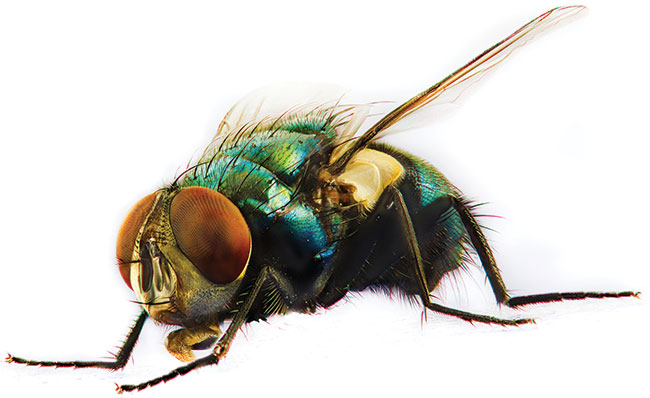By Daniel H. Grove, DVM

If you have horses, you likely have to deal with fly problems at least part of year. Flies are necessary to the environment. They help to breakdown waste products and can even be beneficial in cleaning up infected wounds. Flies also can transmit diseases and spread infection to wounds. They also can cause stress to our animals just from their annoyance. This month, let us discuss some methods for controlling flies.
Fly sprays come in either concentrated or ready to use forms. I find they do not usually last very long. It can be helpful to switch brands periodically as the flies become accustomed to one mixture so trying a different one is sometimes helpful. There are also all natural solutions that some owners prefer.
Just like most everything on the planet, there are certain organisms that eat flies at some point in their life-cycle. The three commercially available organism I know of are a predatory wasp that feeds on the pupal stages of developing flies, nematodes that feast on the maggots of flies and Hister beetles that eat fly eggs and maggots. The organisms can be used strategically to try to control the numbers of flies in your area.
Traps that attract flies can help reduce numbers. Adult flies are lured in and cannot get out. Sticky tapes can be deployed in barns that the flies land on and cannot fly away.
These usually are a chemical that kills flies. They also have an attractant to draw the adults in.
These products are added to your horse’s daily ration. They work in varying ways, with the ones that come out in the manure unchanged probably being the safest. Being deposited in the manure has the killing agent in the feed source for the developing flies. Another feed through product is garlic. I have heard reports of it being helpful at higher doses, but beware of bad breath!
These systems have a large tank of spray with piping to nozzles throughout your barn. They automatically spray at a set interval. These work really well to keep flies out of your barn. The chemical usually used is very safe.
This list is not exhaustive. If there was one thing that worked perfectly, everyone would be using it. It is best to develop a fly control plan that uses multiple modalities. I myself like the idea of using predators as it is all natural and there is little to no risk to ourselves or the horses.
–Dan
Leave a Comment
All fields must be filled in to leave a message.